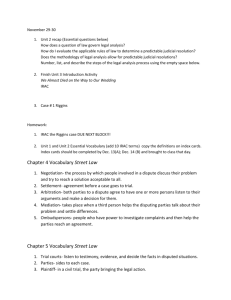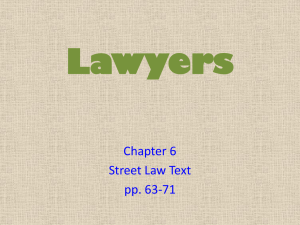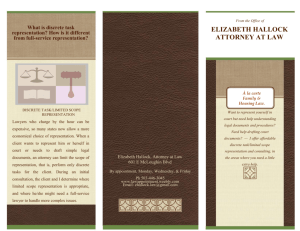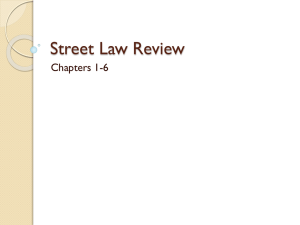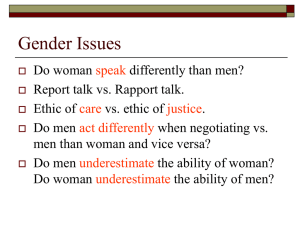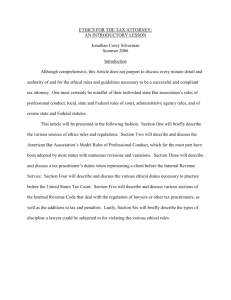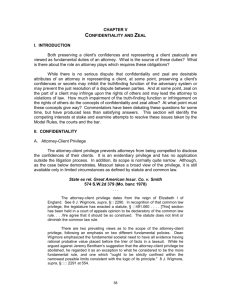PROFESSIONAL RESPONSIBILITY O7' OUTLINE
advertisement
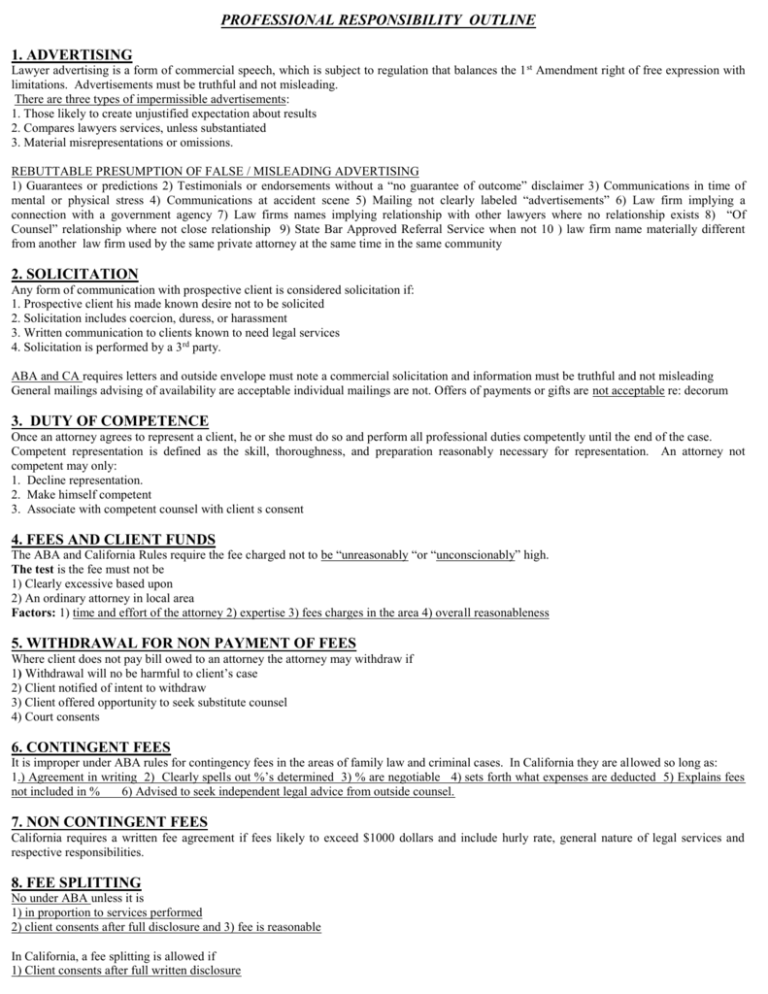
PROFESSIONAL RESPONSIBILITY OUTLINE 1. ADVERTISING Lawyer advertising is a form of commercial speech, which is subject to regulation that balances the 1 st Amendment right of free expression with limitations. Advertisements must be truthful and not misleading. There are three types of impermissible advertisements: 1. Those likely to create unjustified expectation about results 2. Compares lawyers services, unless substantiated 3. Material misrepresentations or omissions. REBUTTABLE PRESUMPTION OF FALSE / MISLEADING ADVERTISING 1) Guarantees or predictions 2) Testimonials or endorsements without a “no guarantee of outcome” disclaimer 3) Communications in time of mental or physical stress 4) Communications at accident scene 5) Mailing not clearly labeled “advertisements” 6) Law firm implying a connection with a government agency 7) Law firms names implying relationship with other lawyers where no relationship exists 8) “Of Counsel” relationship where not close relationship 9) State Bar Approved Referral Service when not 10 ) law firm name materially different from another law firm used by the same private attorney at the same time in the same community 2. SOLICITATION Any form of communication with prospective client is considered solicitation if: 1. Prospective client his made known desire not to be solicited 2. Solicitation includes coercion, duress, or harassment 3. Written communication to clients known to need legal services 4. Solicitation is performed by a 3rd party. ABA and CA requires letters and outside envelope must note a commercial solicitation and information must be truthful and not misleading General mailings advising of availability are acceptable individual mailings are not. Offers of payments or gifts are not acceptable re: decorum 3. DUTY OF COMPETENCE Once an attorney agrees to represent a client, he or she must do so and perform all professional duties competently until the end of the case. Competent representation is defined as the skill, thoroughness, and preparation reasonably necessary for representation. An attorney not competent may only: 1. Decline representation. 2. Make himself competent 3. Associate with competent counsel with client s consent 4. FEES AND CLIENT FUNDS The ABA and California Rules require the fee charged not to be “unreasonably “or “unconscionably” high. The test is the fee must not be 1) Clearly excessive based upon 2) An ordinary attorney in local area Factors: 1) time and effort of the attorney 2) expertise 3) fees charges in the area 4) overall reasonableness 5. WITHDRAWAL FOR NON PAYMENT OF FEES Where client does not pay bill owed to an attorney the attorney may withdraw if 1) Withdrawal will no be harmful to client’s case 2) Client notified of intent to withdraw 3) Client offered opportunity to seek substitute counsel 4) Court consents 6. CONTINGENT FEES It is improper under ABA rules for contingency fees in the areas of family law and criminal cases. In California they are allowed so long as: 1.) Agreement in writing 2) Clearly spells out %’s determined 3) % are negotiable 4) sets forth what expenses are deducted 5) Explains fees not included in % 6) Advised to seek independent legal advice from outside counsel. 7. NON CONTINGENT FEES California requires a written fee agreement if fees likely to exceed $1000 dollars and include hurly rate, general nature of legal services and respective responsibilities. 8. FEE SPLITTING No under ABA unless it is 1) in proportion to services performed 2) client consents after full disclosure and 3) fee is reasonable In California, a fee splitting is allowed if 1) Client consents after full written disclosure 2) fee is not unconscionably high. California does not require the other attorney to do any work. 9. CLIENT FUNDS All funds paid to lawyer, other than advances for costs and expenses shall be deposited in a bank account. Record Keeping requirements: 1) Notify immediately 2) Identify and Label Property 3) Keep Records 4) Prompt payment or Delivery of Client Property A lawyer must not disburse client funds without client’s approval. 10. CONFLICTS OF INTEREST All professional codes, both ABA and California Rules, strictly proscribe and limit a lawyer’s ability to work with clients where there is a direct conflict of interest which materially and adversely affects lawyers’ ability to represent the client. The lawyer has an immediate obligation to: 1) Assess circumstances of dual representation 2) Discuss potential conflict with both clients 3) Full disclosure of conflicts might arise and how they could arise 4) get clients consent to represent both 5) withdraw if necessary JOINT REPRESENTATION Prong one: a) Reasonable belief and b) Balancing Test Prong two: Necessity Prong three: a) Full disclosure and b) Informed consent Prong four: Would disinterested attorney agree to represent A lawyer may represent multiple clients if 1) it is obvious he can adequately represent the interest of each 2) Each consents after full disclosure and 3) California requires both plus in writing. 11. PAYMENTS BY THIRD PARTIES Lawyer shall not accept compensation from third party unless: 1) Client consents 2) No interference with lawyers professional judgment and 3) Confidentiality of information is preserved. 12. WITHDRAWAL MANDATORY WITHDRAWAL: 1) Knowing violation of Rules, Code, or other law 2) Lawyers mental or physical ability is impaired and 3) Lawyer is discharged by client PERMISSIVE WITHRAWAL: 1) Crime or fraud 2) objectives f client are repugnant or imprudent 3) financial burden 4) good cause 13. ZEALOUS REPRESENTATION Avoid frivolous claims, duty of candor to court, Fairness to opposing counsel, and the big one is Fruits of a crime Under Meredith v. California, a lawyer is under no duty to retrieve fruits of a crime when revealed during representation of a client. Duty of confidentiality- An attorney owes a duty to keep confidential all information he learns from client.. Attorney- Client Privilege- prevents compelled disclosure of confidential communications, client is the holder of the privilege. 14. CONFIDENCES AND SECRETS A lawyer may not reveal or use any information received from the client in the course of the relationship. An attorney owes a duty of confidentiality before and after representation. Confidences- anything protected by attorney- client privilege Secrets- anything learned in course of representation Former Clients- Both ABA and California Rules state an attorney who has confidential information regarding a client from previous representation may no represent another client if to do so would result in disclosure harmful to the client. 2 prong Test 1. Full disclosure and Informed Consent? 2. Would Disinterested Attorney Agree? A lawyer may reveal intent to commit serious violent crimes if: 1) Satisfied beyond substantial doubt 2) Crime is serious and imminent danger 3) Benefits outweigh importance of protecting confidentiality



